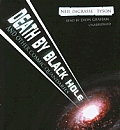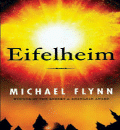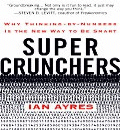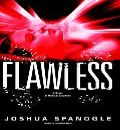September 2007
THE LOWE DOWN ON AUDIOBOOKS
reviewed by Jonathan Lowe
 The
mechanics of science rarely invade the media of mass culture,
and the reason is obvious. Ignorant of little more than
sound bites and so called "reality" shows, the
typical American consumer is not only near-sighted, but
insular. While he may own a cell phone, a WiFi accessible
computer, a plasma TV and an iPod, he doesn't really understand
how they work--or care. To interest such a person, one
must be both entertaining and provocative, which is just
what astrophysicist Neil DeGrasse Tyson does in DEATH
BY BLACK HOLE, a collection of carefully arranged
essays written for Natural History magazine. Read by actor
Dion Graham, the book is a patient, simplified cosmic
guide that puts in perspective what is knowable about
the biggest questions of all--where we come from, are
we alone in the universe, and does religion fit in. While
it can't answer these questions, it does reveal their
depth, dispelling widely held myths. The title refers
to what may be the most bizarre way to die, (and one which
CSI will never be able to investigate.) Seen on the PBS
program NOVA, and possessing innate communications skills
himself, Tyson could have narrated this audiobook version,
had he time. But what exactly is time, or gravity? And
why can't he--or anyone--move faster than the speed of
light? Tyson patiently explains, wielding the voice of
an equally entertaining professional reader, who seems
to have grasped the essence of Tyson's persona. In the
process, the listener begins to imagine the Earth as a
grain of sand on the cosmic beach. So much for thinking
celebrity awards shows are all that important! True to
ironic form, the production is also available in Mp3 format
for direct download to the now astronomical number of
iPods out there. (Blackstone Audio; 12 hours unabridged)
AMAZON.COM The
mechanics of science rarely invade the media of mass culture,
and the reason is obvious. Ignorant of little more than
sound bites and so called "reality" shows, the
typical American consumer is not only near-sighted, but
insular. While he may own a cell phone, a WiFi accessible
computer, a plasma TV and an iPod, he doesn't really understand
how they work--or care. To interest such a person, one
must be both entertaining and provocative, which is just
what astrophysicist Neil DeGrasse Tyson does in DEATH
BY BLACK HOLE, a collection of carefully arranged
essays written for Natural History magazine. Read by actor
Dion Graham, the book is a patient, simplified cosmic
guide that puts in perspective what is knowable about
the biggest questions of all--where we come from, are
we alone in the universe, and does religion fit in. While
it can't answer these questions, it does reveal their
depth, dispelling widely held myths. The title refers
to what may be the most bizarre way to die, (and one which
CSI will never be able to investigate.) Seen on the PBS
program NOVA, and possessing innate communications skills
himself, Tyson could have narrated this audiobook version,
had he time. But what exactly is time, or gravity? And
why can't he--or anyone--move faster than the speed of
light? Tyson patiently explains, wielding the voice of
an equally entertaining professional reader, who seems
to have grasped the essence of Tyson's persona. In the
process, the listener begins to imagine the Earth as a
grain of sand on the cosmic beach. So much for thinking
celebrity awards shows are all that important! True to
ironic form, the production is also available in Mp3 format
for direct download to the now astronomical number of
iPods out there. (Blackstone Audio; 12 hours unabridged)
AMAZON.COM
|
 Moving
from science to science fiction, there's the intriguing
EIFELHEIM, from the award winning Michael
Flynn. It's about a historian and his theoretical physicist
girlfriend, who investigate the history of a German town
that mysteriously disappeared in 1349. At first they think
it had something to do with the Black Death, which was
infecting Europe at the time. But due to the multiple
viewpoints the listener knows that it was the site of
first contact with aliens, where a spaceship "crashed"
in the nearby forest. Although "crash" is not
the right word, as the ship travelled through from another
dimension or alternate universe. Moving between the past
and present, the story is narrated by Anthony Heald, best
known for playing Hannibal Lecter's jail nemesis in "The
Silence of the Lambs." It's also the best thing about
the audiobook, since Heald is an incredible actor, with
a quirky delivery that's particularly chilling in his
subdued voice portrayal of several of the aliens. (Blackstone
Audio; 17 hours unabrided)
AMAZON.COM Moving
from science to science fiction, there's the intriguing
EIFELHEIM, from the award winning Michael
Flynn. It's about a historian and his theoretical physicist
girlfriend, who investigate the history of a German town
that mysteriously disappeared in 1349. At first they think
it had something to do with the Black Death, which was
infecting Europe at the time. But due to the multiple
viewpoints the listener knows that it was the site of
first contact with aliens, where a spaceship "crashed"
in the nearby forest. Although "crash" is not
the right word, as the ship travelled through from another
dimension or alternate universe. Moving between the past
and present, the story is narrated by Anthony Heald, best
known for playing Hannibal Lecter's jail nemesis in "The
Silence of the Lambs." It's also the best thing about
the audiobook, since Heald is an incredible actor, with
a quirky delivery that's particularly chilling in his
subdued voice portrayal of several of the aliens. (Blackstone
Audio; 17 hours unabrided)
AMAZON.COM
|
 Next, can you force someone to love you? Yes, according
to author Nicholas Boothman in HOW TO MAKE SOMEONE
LOVE YOU FOREVER. Ostensibly, such a task takes
time, since you can't hurry love. Hence, the subtitle
here is In 90 Minutes or Less, which is longer
than Boothman took last time out, when he penned How
to Make People Like You in 90 Seconds or Less. Actually,
the book takes a while to listen to, and the author suits
the narration, being a former fashion photographer and
ad man, now a non-verbal communications guru. In an age
when looks matter most, he schools listeners on how to
dress, how to act, and what to say. . . whether you want
to be a Stepford wife or not. While much of what's discussed
seems obvious, the most intriguing aspects are those we
may overlook, as the author points out our subconscious
defensive postures, which take conscious effort to overcome.
Because just being yourself may not get you love, unfortunately,
if don't know how to hide your insecurities or a suspicious
nature. (Listen & Live Audio; 4 hours abridged)
AMAZON.COM
Next, can you force someone to love you? Yes, according
to author Nicholas Boothman in HOW TO MAKE SOMEONE
LOVE YOU FOREVER. Ostensibly, such a task takes
time, since you can't hurry love. Hence, the subtitle
here is In 90 Minutes or Less, which is longer
than Boothman took last time out, when he penned How
to Make People Like You in 90 Seconds or Less. Actually,
the book takes a while to listen to, and the author suits
the narration, being a former fashion photographer and
ad man, now a non-verbal communications guru. In an age
when looks matter most, he schools listeners on how to
dress, how to act, and what to say. . . whether you want
to be a Stepford wife or not. While much of what's discussed
seems obvious, the most intriguing aspects are those we
may overlook, as the author points out our subconscious
defensive postures, which take conscious effort to overcome.
Because just being yourself may not get you love, unfortunately,
if don't know how to hide your insecurities or a suspicious
nature. (Listen & Live Audio; 4 hours abridged)
AMAZON.COM
|
|  Two
more new books are also out, both of which reveal our
changing culture, and both of their authors went to Yale.
First is SUPER CRUNCHERS, by "econometrician"
and lawyer Ian Ayres, about statistical analysis in the
new America. While you may have long suspected you were
only a "number in the system," here's proof
that you really are. Because not only are your demographics
being analyzed by advertisers, but your individual history
of purchases is being melded with reams of other data
regarding how likely you are to respond to sales pitches,
charity drives, or direct mail and magazine ads. All that
information is crunched inside silicon chips before you're
ever targeted. If they know your age, your income, and
where you live, all they need is to trace your buying
habits, and they'll also know how you'll vote, what you'll
likely to want next, and what percentage rate you're apt
to accept on a credit card--information that's fully displayed
on the computer screen of that company rep you have on
the phone. Sound scary? Welcome to the new information
age, where having an original thought is about as rare
as an angel in the infield. . .or minefield. Actor James
Lurie narrates, lending his controlled vocal skills to
any defects in Ayres' own voice, making this a engrossing
account of the strange-but-true, like an episode of the
TV show "Numbers." Ayres even claims he arrived
at the title by analyzing the number of hits on a proposed
website. Now if only someone would crunch the numbers
on Iraq, we'd finally demand term limits before our economy
collapses. (Random House Audio; 6 hours abridged)
AMAZON.COM Two
more new books are also out, both of which reveal our
changing culture, and both of their authors went to Yale.
First is SUPER CRUNCHERS, by "econometrician"
and lawyer Ian Ayres, about statistical analysis in the
new America. While you may have long suspected you were
only a "number in the system," here's proof
that you really are. Because not only are your demographics
being analyzed by advertisers, but your individual history
of purchases is being melded with reams of other data
regarding how likely you are to respond to sales pitches,
charity drives, or direct mail and magazine ads. All that
information is crunched inside silicon chips before you're
ever targeted. If they know your age, your income, and
where you live, all they need is to trace your buying
habits, and they'll also know how you'll vote, what you'll
likely to want next, and what percentage rate you're apt
to accept on a credit card--information that's fully displayed
on the computer screen of that company rep you have on
the phone. Sound scary? Welcome to the new information
age, where having an original thought is about as rare
as an angel in the infield. . .or minefield. Actor James
Lurie narrates, lending his controlled vocal skills to
any defects in Ayres' own voice, making this a engrossing
account of the strange-but-true, like an episode of the
TV show "Numbers." Ayres even claims he arrived
at the title by analyzing the number of hits on a proposed
website. Now if only someone would crunch the numbers
on Iraq, we'd finally demand term limits before our economy
collapses. (Random House Audio; 6 hours abridged)
AMAZON.COM
|
 Finally, there is FLAWLESS,
a medical thriller by Stanford med student and Yale grad
Joshua Spanogle, about a former CDC detective who can't
leave the profession because an old friend has been murdered,
and he's needed to investigate the dead man's medical
research papers involving a dangerous cosmetic drug. What
makes the story interesting is not so much the writing
or plotting, which can be simplistic or clichéd,
but rather the learning process of the protagonist, and
the subject matter. Given that we're all numbers, now,
it follows that the more perfect your numbers, the more
desirable and "worthy" of love. One's "figure"
should be flawless, while the number of tiny lines and
wrinkles should be few. Be willing to pay any price for
this, Spanogle seems to be saying, and that price may
be larger than the number pi. Scott Brick narrates, and
is always a pleasure to listen to, forever breathing life
into a host of characters, flawed or otherwise. (Random
House Audio; 6.5 hours abridged) AMAZON.COM
Finally, there is FLAWLESS,
a medical thriller by Stanford med student and Yale grad
Joshua Spanogle, about a former CDC detective who can't
leave the profession because an old friend has been murdered,
and he's needed to investigate the dead man's medical
research papers involving a dangerous cosmetic drug. What
makes the story interesting is not so much the writing
or plotting, which can be simplistic or clichéd,
but rather the learning process of the protagonist, and
the subject matter. Given that we're all numbers, now,
it follows that the more perfect your numbers, the more
desirable and "worthy" of love. One's "figure"
should be flawless, while the number of tiny lines and
wrinkles should be few. Be willing to pay any price for
this, Spanogle seems to be saying, and that price may
be larger than the number pi. Scott Brick narrates, and
is always a pleasure to listen to, forever breathing life
into a host of characters, flawed or otherwise. (Random
House Audio; 6.5 hours abridged) AMAZON.COM
|
©
MyShelf.Com. All Rights Reserved. |